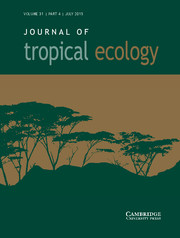Crossref Citations
This article has been cited by the following publications. This list is generated based on data provided by
Crossref.
Cáceres, Nilton C.
Bornschein, Marcos R.
Lopes, Wellington H.
and
Percequillo, Alexandre R.
2007.
Mammals of the Bodoquena Mountains, southwestern Brazil: an ecological and conservation analysis.
Revista Brasileira de Zoologia,
Vol. 24,
Issue. 2,
p.
426.
Rocha, Vlamir J.
Aguiar, Lucas M.
Silva-Pereira, José E.
Moro-Rios, Rodrigo F.
and
Passos, Fernando C.
2008.
Feeding habits of the crab-eating fox, Cerdocyon thous (Carnivora: Canidae), in a mosaic area with native and exotic vegetation in Southern Brazil.
Revista Brasileira de Zoologia,
Vol. 25,
Issue. 4,
p.
594.
Zhou, Youbing
Zhang, Jinshuo
Slade, Eleanor
Zhang, Libiao
Palomares, Francisco
Chen, Jin
Wang, Xiaoming
and
Zhang, Shuyi
2008.
Dietary Shifts in Relation to Fruit Availability among Masked Palm Civets (Paguma larvata) in Central China.
Journal of Mammalogy,
Vol. 89,
Issue. 2,
p.
435.
MACHADO, FABIO DE A.
and
HINGST-ZAHER, ERIKA
2009.
Investigating South American biogeographic history using patterns of skull shape variation on Cerdocyon thous (Mammalia: Canidae).
Biological Journal of the Linnean Society,
Vol. 98,
Issue. 1,
p.
77.
Whiteside, Douglas P.
2009.
Nutrition and Behavior of Coatis and Raccoons.
Veterinary Clinics of North America: Exotic Animal Practice,
Vol. 12,
Issue. 2,
p.
187.
Di Bitetti, Mario S.
Di Blanco, Yamil E.
Pereira, Javier A.
Paviolo, Agustín
and
Pírez, Ignacio Jiménez
2009.
Time Partitioning Favors the Coexistence of Sympatric Crab-Eating Foxes (Cerdocyon thous) and Pampas Foxes (Lycalopex gymnocercus).
Journal of Mammalogy,
Vol. 90,
Issue. 2,
p.
479.
de Barros Ferraz, Katia Maria Paschoaletto Micchi
de Siqueira, Marinez Ferreira
Martin, Paula Sanches
Esteves, Carolina Franco
and
do Couto, Hilton Thadeu Zarate
2010.
Assessment of Cerdocyon thous distribution in an agricultural mosaic, southeastern Brazil.
mamm,
Vol. 74,
Issue. 3,
p.
275.
Abreu, Maury Sayão Lobato
Christoff, Alexandre Uarth
and
Vieira, Emerson Monteiro
2011.
Identificação de marsupiais do Rio Grande do Sul através da microestrutura dos pelos-guarda.
Biota Neotropica,
Vol. 11,
Issue. 3,
p.
391.
Aguiar, Lucas M.
Moro-Rios, Rodrigo F.
Silvestre, Thiago
Silva-Pereira, José E.
Bilski, Diego R.
Passos, Fernando C.
Sekiama, Margareth L.
and
Rocha, Vlamir J.
2011.
Diet of brown-nosed coatis and crab-eating raccoons from a mosaic landscape with exotic plantations in southern Brazil.
Studies on Neotropical Fauna and Environment,
Vol. 46,
Issue. 3,
p.
153.
Sousa, W.P.
and
Dangremond, E.M.
2011.
Treatise on Estuarine and Coastal Science.
p.
43.
Voss, Robert S.
and
Jansa, Sharon A.
2012.
Snake‐venom resistance as a mammalian trophic adaptation: lessons from didelphid marsupials.
Biological Reviews,
Vol. 87,
Issue. 4,
p.
822.
Quintela, Fernando M.
Iob, Graziela
and
Artioli, Luiz G. S.
2014.
Diet of Procyon cancrivorus (Carnivora, Procyonidae) in restinga and estuarine environments of southern Brazil.
Iheringia. Série Zoologia,
Vol. 104,
Issue. 2,
p.
143.
Lemos, Hudson de Macedo
Silva, Carina Azevedo Oliveira
Patiu, Fabio de Mello
and
Gonçalves, Pablo Rodrigues
2015.
Barn Owl pellets (Aves: Tyto furcata) reveal a higher mammalian richness in the Restinga de Jurubatiba National Park, Southeastern Brazil.
Biota Neotropica,
Vol. 15,
Issue. 2,
Kasper, Carlos Benhur
Peters, Felipe Bortolotto
Christoff, Alexandre Uarth
and
de Freitas, Thales Renato Ochotorena
2016.
Trophic relationships of sympatric small carnivores in fragmented landscapes of southern Brazil: niche overlap and potential for competition.
Mammalia,
Vol. 80,
Issue. 2,
Melo, Michele Molina
Silva, Cristina Magalhães
Barbosa, Carina Santos
Morais, Maristela Calvente
D'Anunciação, Paula Eveline Ribeiro
Silva, Vinícius Xavier da
and
Hasui, Érica
2016.
Fragment edge and isolation affect the food web: effects on the strength of interactions among trophic guilds.
Biota Neotropica,
Vol. 16,
Issue. 2,
Cepeda Duque, Juan Camilo
2016.
Presencia del Mapache Cangrejero Procyon cancrivorus (Carnivora: Procyonidae) en un agroecosistema del municipio de Santa Rosa de Cabal, Risaralda, Colombia.
Mammalogy Notes,
Vol. 3,
Issue. 1,
p.
10.
Bianchi, Rita de Cassia
Olifiers, Natalie
Gompper, Matthew E.
Mourão, Guilherme
and
Somers, Christopher M.
2016.
Niche Partitioning among Mesocarnivores in a Brazilian Wetland.
PLOS ONE,
Vol. 11,
Issue. 9,
p.
e0162893.
Massara, Rodrigo L.
Paschoal, Ana Maria O.
Bailey, Larissa L.
Doherty, Paul F.
and
Chiarello, Adriano G.
2016.
Ecological interactions between ocelots and sympatric mesocarnivores in protected areas of the Atlantic Forest, southeastern Brazil.
Journal of Mammalogy,
Vol. 97,
Issue. 6,
p.
1634.
Penido, Gabriel
Astete, Samuel
Jácomo, Anah T A
Sollmann, Rahel
Tôrres, Natalia
Silveira, Leandro
and
Marinho Filho, Jader
2017.
Mesocarnivore activity patterns in the semiarid Caatinga: limited by the harsh environment or affected by interspecific interactions?.
Journal of Mammalogy,
Vol. 98,
Issue. 6,
p.
1732.
Scinachi, Claudia A.
Takeda, Gabriela A.C.G.
Mucci, Luís Filipe
and
Pinter, Adriano
2017.
Association of the occurrence of Brazilian spotted fever and Atlantic rain forest fragmentation in the São Paulo metropolitan region, Brazil.
Acta Tropica,
Vol. 166,
Issue. ,
p.
225.


